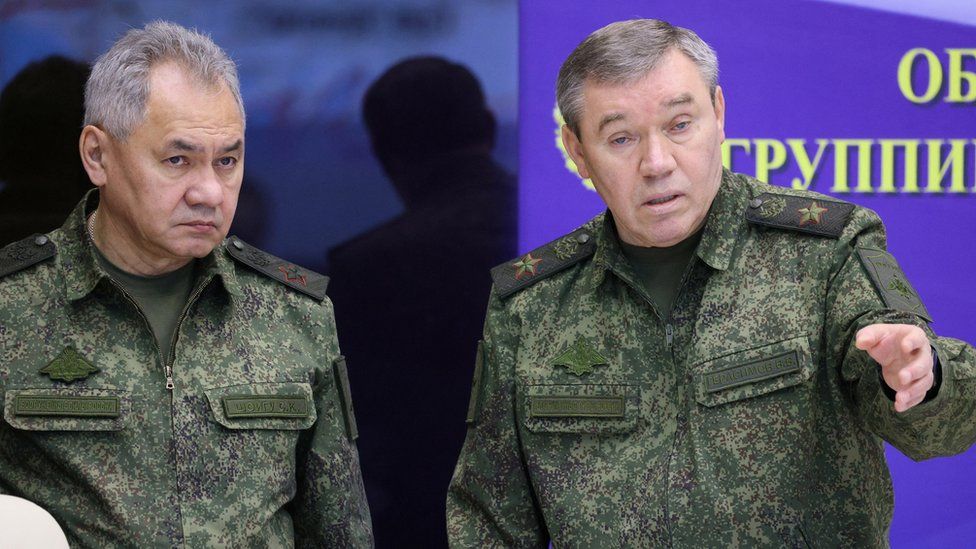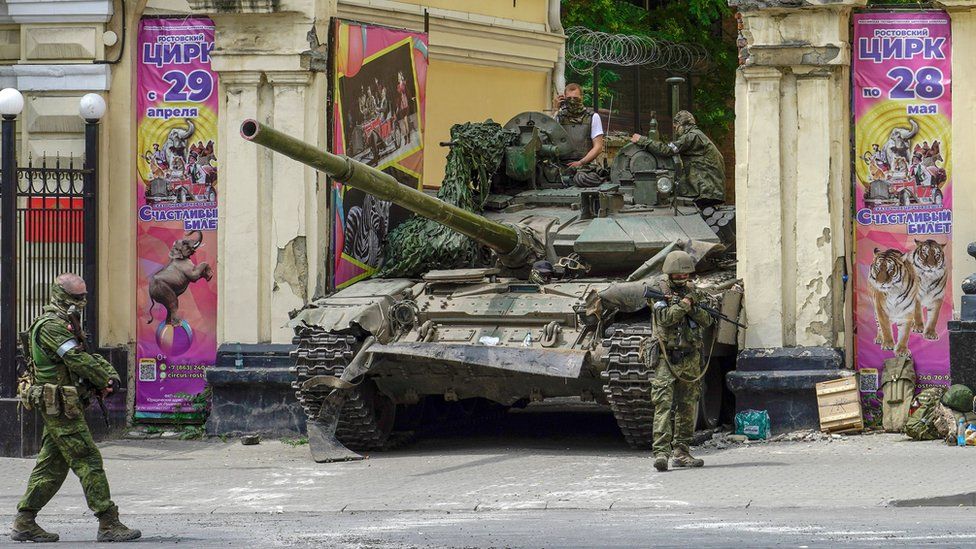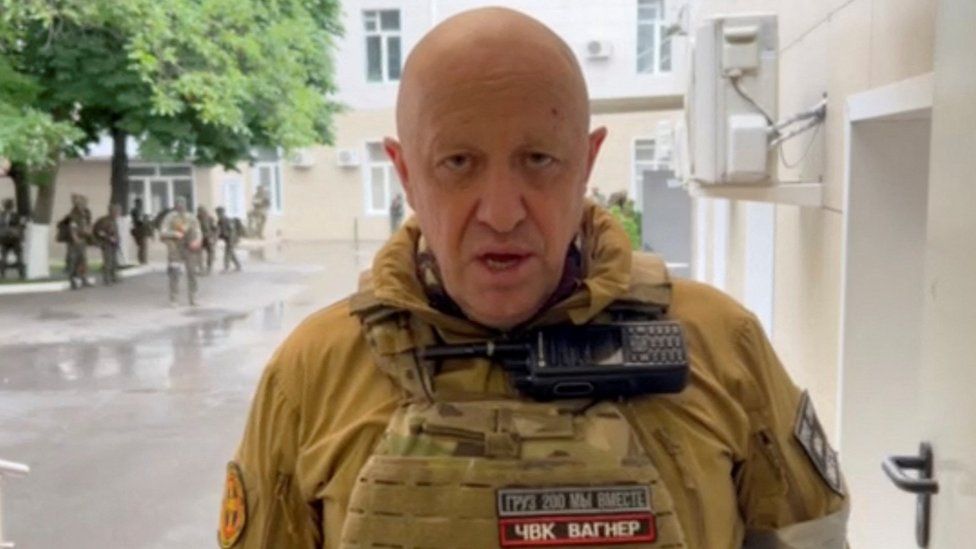The Wagner mutiny only lasted a little over 24 hours in total. But the toxic concoction of resentment, rivalry, and ambition that gave rise to it had been simmering for months, if not years.
Yevgeny Prigozhin, the creator and leader of the paramilitary Wagner group, and Sergei Shoigu and Valery Gerasimov, the commanders of Russia's massive military, served as the drama's main protagonists.
Prigozhin, a former felon who was involved in organized crime in the 1980s and served time in prison for it, is a Kremlin creation who owes his enormous wealth to President Vladimir Putin.
He has emerged as a crucial tool in Mr. Putin's effort to reassert Russian influence around the world since he founded the Wagner mercenary group in 2014. His forces, made up of seasoned former Russian special forces, have quietly supported Mr. Putin's ally Bashar Al-Assad in Syria and assisted in reversing and replacing French influence in Mali.
Up until last year, Prigozhin vehemently denied running the private militia despite mounting evidence to the contrary and sued Bellingcat journalist Elliot Higgins in British courts.
Because his group's activities were covert, he won Mr. Putin's favor and was able to expand his own power base, which over the past year has grown to rival that of the security and military elite that dominates Russia.
The rise of this man, who is at ease with violence, corruption, and ambition, is representative of the modern state that President Vladimir Putin has created over the past 24 years.
In spite of his growing influence, he has remained an outsider in Mr. Putin's small inner circle of advisers and has not shied away from calling out corrupt, inefficient, or both Moscow officials.
And he has long held a grudge against the defense minister, Sergei Shoigu, who is also an outsider, as well as the military chief, Valery Gerasimov.

Contrary to the majority of Mr. Putin's top advisors, who typically come from the president's hometown of St. Petersburg, Mr. Shoigu was born in a small village near the Russian-Mongolian border.
Mr. Shoigu, who oversaw the Russian military for more than a decade, never wore a uniform; instead, he worked his way up through the Communist Party before taking the helm of Russia's emergency ministry in the 1990s.
The ultimate army insider is Mr. Gerasimov, the third character in this conflict. He became the longest-serving post-Soviet military chief after getting his start putting down a bloody rebellion in Chechnya in the 1990s.
Tensions between the men are thought to have existed for a number of years as a result of Prigozhin's increasing significance in the projection of Russian power, as well as his organization's capacity to recruit top special forces operators from the military by promising them higher salaries.
But Prigozhin's animosity toward the military establishment has only recently surfaced, particularly following the bloody fighting in the meat grinder of Bakhmut, where thousands of Wagner troops are thought to have died.
Bakhmut is a small city with a pre-war population of about 70,000, so the attempt to take it over is perplexing. Prigozhin allegedly planned the campaign to give him the opportunity to take credit for a victory in the midst of the military's waning campaign, but most observers think it has little military significance.
He frequently charged Mr. Gerasimov and Mr. Shoigu with "constantly trying to steal [credit for] Wagner's victory" in places like Soledar, where thousands of paramilitary troops—often drawn from prisons—died.
And in contrast to his more bureaucratic rivals, Progozhin's frequent foul-mouthed outbursts made him a figure who frequently attracted the attention of international media. According to documents that were leaked, the Russian defense ministry was unsure how to counter his messaging and rising popularity.
However, Vladimir Putin in the Kremlin was content for it to continue.
President Putin's approach to conflict is to let it simmer. He has long tolerated power struggles between rival centers of influence because he thought it would keep one group from becoming sufficiently powerful to directly challenge him.
In a piece published last year, political science professor Daniel Triestman of the University of California, Los Angeles, noted that officials "with armed men at their command lack the mutual trust to organise a conspiracy" and that the system Mr. Putin created contains "tripwires" to prevent a coup.
In this regime, Mr. Shoihu is kept in check by Wagner, and the military continues to intimidate the mercenaries. Mr. Putin, who controls the chess pieces' placement on the board and the system's balance, is seated at the top of the pyramid.
In contrast, Prigozhin has consistently taken care to avoid criticizing the president directly, arguing that Mr. Putin's failures since the invasion in February 2022 were caused by his commanders' misdirection.
Allowing the mercenary boss to blame subordinates for the military campaign's failure served a purpose for Mr. Putin. The Russian president is rumored to have privately reprimanded Gerasimov and Shoigu for the invasion's glacial pace.
But in recent months, Mr. Putin's steadfast strategy has begun to show signs of weakness.
As his forces attempted to complete the capture of Bakhmut, Prigozhin, growing enraged over his suspicion that the military was denying them ammunition, started posting increasingly insane Telegram rants.
He raged in one video, saying: "You [expletive] who aren't giving us ammunition, you scum, you will eat their guts in Hell!" as the visible remains of dozens of dead Wagner fighters surrounded him in the background.
"Where is Shoigu? Gerasimov? ammunition? He yelled in another video, apparently trying to blackmail Moscow by threatening to withdraw his forces from the front lines and give up the fight for Bakhmut, "They came here as volunteers and die for you to fatten yourselves in your mahogany offices.
Prigozhin was called to a meeting with Mr. Putin and Mr. Shoigu on February 22, the same day he posted the video among the Wagner corpses, according to US intelligence documents released by American airman Jack Teixera.
In one document, the defence chief's surname was spelled differently, and it stated that the meeting "almost certainly concerned, at least in part, Prigozhin's public accusations and resulting tension with Shoygu.".
But it doesn't seem like the summit had the desired outcome.

In the meantime, Mr. Shoigu was polishing a strategy that he hoped would permanently lessen his rival's influence in Moscow.
Despite the defense chief's alleged insecurities regarding his lack of uniformed service, he is unmatched in his ability to manipulate the Russian political system to his advantage.
Few of President Putin's advisors have spent as much time by his side as he has, working at the Kremlin in various capacities since 1991.
He announced his strategy on June 10 by saying "volunteer formations" would be required to sign contracts with the ministry of defense directly, integrating them into the military and giving them a new legal status.
The legislation gave PMCs, or Volunteer Formations, until July 1 to abide by the rules and sign the contracts.
Despite the fact that the announcement didn't specifically mention Wagner, it was widely perceived as a move to lessen Prigozhin's influence, which immediately incited the mercenary boss' rage.
Wagner will not enter into any agreements with Shoigu, Prigozhin yelled. Shoigu is unable to effectively command a military formation. ".
The action will, nevertheless, have raised red flags in Prigozhin's mind. As a seasoned politician, Mr. Shoigu would not have moved to seize control of Wagner without being aware of President Putin's blessing.
After months of engaging in his attention-seeking rants and criticizing the "special military operation," Prigozhin may have realized that the president had finally decided to support his defense chiefs and marginalize his longtime ally.
Days later, Mr. Putin personally endorsed the action, telling reporters in Moscow that it was "in line with common sense" and needed to be "done as quickly as possible.".
Prigozhin "likely gambled that his only avenue to retain Wagner Group as an independent force was to march against the Russian Ministry of Defence," according to the US-based Institute for the Study of War (ISW), suggesting that this was the time he began to plan his mutiny.
His troops soon intensified their offensive against the regular military, accusing a Russian field commander of firing on Wagner's soldiers.
The Biden administration was informed by intelligence officials that Prigozhin was preparing some sort of action after they had spent days analyzing Wagner's movements, according to US media reports.
And on Friday, the mercenary boss launched his harshest attack yet on the defense minister.
Prigozhin raged that the conflict was nothing more than an excuse for Mr. Shoigu to win more medals and win the highest military honor of being promoted to Marshal, departing from the false Russian narrative that has long been promoted by President Putin himself, according to which Russia invaded Ukraine to fend off Nato and Nazis.
He exploded in a Telegram video, accusing the Ministry of Defence of trying to fool both the public and the president.
Less than two weeks after the defense ministry revealed their intention to seize control of the Wagner Group, Prigozhin and his troops left Ukraine and occupied Rostov in Russia that evening.
Some have conjectured that Prigozhin settled down after obtaining concessions from Mr. Putin, possibly including a new leader for the defense ministry, but it's unclear whether this is accurate. .
It's not clear who would take Mr. Shoigu's and Mr. Gerasimov's places.
A promotion may be in the works for Gen. Sergei Surovikin, a former ally of Progozhin who spoke out against his mutiny. He was behind the largely ineffective bombing campaign against civilian targets and was known as General Armageddon. He briefly oversaw the invasion force last year.
What happens to Prigozhin personally is a different story. The ISW noted that "many Wagner personnel will likely be displeased with the potential of signing contracts" with the defense ministry, and that his decision to call off his march on Moscow will likely infuriate many hard-line pro-war elements in Russia.
Also unknown is whether he will be allowed to keep his enormous wealth. According to reports in Russian media, the £38 million ($48 million) in cash discovered during a raid on the Wagner headquarters in St. Petersburg was used to pay the families of deceased soldiers, according to Prigozhin.
The circumstances that led to the mutiny still exist, despite the fact that this uprising was largely put down before it could grow, and the military team of Shoigu and Gerasimov has eliminated a significant threat to their authority.
With the support of a group of security personnel, oil tycoons, and oligarchs, about ten private military companies are currently in operation in Russia.
According to the US State Department, Mr. Shoigu allegedly owns and controls Patriot PMC, a business that competes with Wagner directly in Ukraine. .
The belief that President Vladimir Putin's government is better equipped to withstand a protracted conflict in Ukraine than President Volodymyr Zelensky's government in Kyiv must now be at best dubious.
Ruslan Pukhov, an analyst with the Moscow-based Centre for Analysis of Strategies and Technologies (Cast), described the hopes of a portion of the Russian elite, including, reportedly, the president himself, that a protracted war is advantageous for Russia.
"An extension of the conflict puts the Russian Federation at serious domestic political risk.
. "







